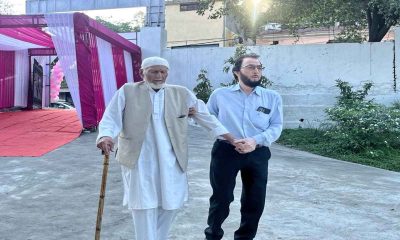Religion
Bhagwaan Jagannath, a spiritual theatrical play
They say faith takes you to a new level of consciousness. There is so much mysticism surrounding Lord Jagannath that a devotee becomes one with the Mahaabaahu, if he dedicates him-/herself to His service.
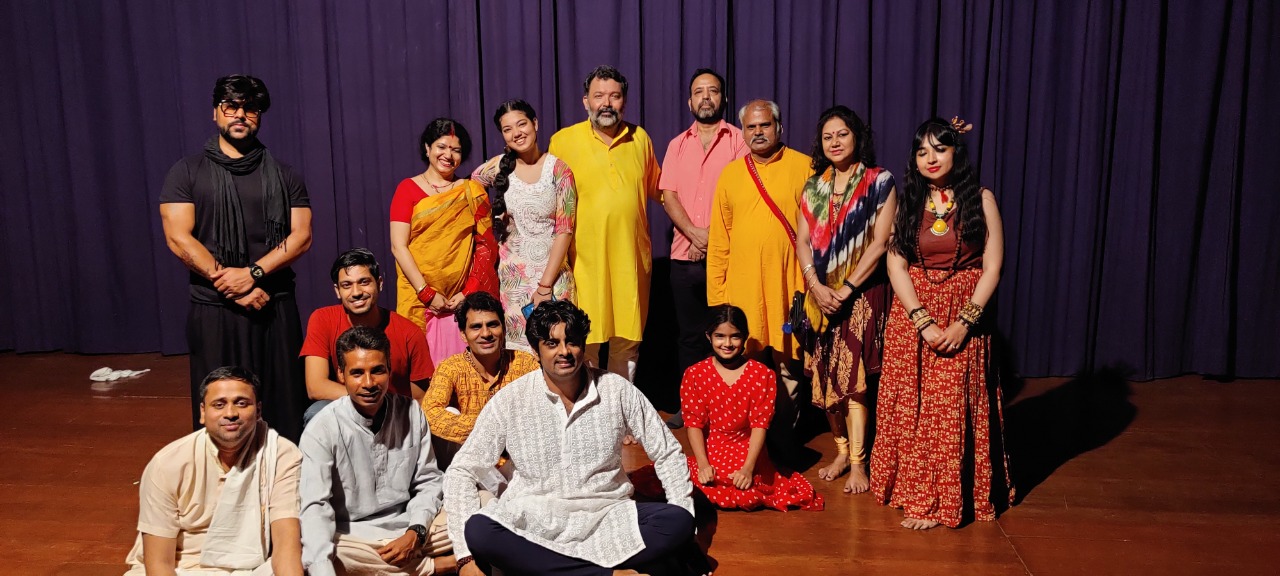
They say faith takes you to a new level of consciousness. There is so much mysticism surrounding Lord Jagannath that a devotee becomes one with the Mahaabaahu, if he dedicates him-/herself to His service.
Dhananjay Kapoor, internationally awarded filmmaker, writer and actor, is one of millions of devotees who have experienced the Jagannath magic, nearly seven years back.
How did this connection happen?
It was in 2013 when the filmmaker experienced a rare health issue of his heartbeat being nearly double that of the normal rate, he recalled. He could not even walk two steps without getting exhausted.
“I saw a doctor who said only a miracle can save me. Then my Guru told me to read Bhagavad Geeta, do ‘shastaang’ and give up on all vices, including non-vegetarian food. After religiously following the advice, I was able to recover and lead a normal life. Though my heart still races at 100, I manage to walk 10 km,” he said.
The filmmaker’s connection with the Lord of the Universe is so deep and intense that he has embarked on a mission to stage a play on Bhagwaan Jagannath across the globe.“The spiritual play on Lord Jagannath (currently in Hindi) depicts the story of how Bhagwaan Jagannath came to earth, in this very special form, along with His brother Balabhadra and sister Subhadra,” said Kapoor, explaining his play.
“It is a very dramatic play that also reveals the philosophy of Sanatana Dharma and explains the beautiful nuggets of our spiritual culture which is very important especially for our youth and children to understand and appreciate,” he added.
When we asked Kapoor how he managed to prepare this huge theatrical venture in the midst of lockdown restrictions, he said, “The actors of his theatre group Bhandira Tree had been rehearsing in the auditorium of the ISKCON temple, Juhu, Mumbai, since January 2021 however the group was not ready with the play when the lockdown happened in April and we needed around 3 more months of rehearsals…the lockdown was demotivating for the artistes… it seemed that all the hard work would go in vain”.
At that time Kapoor came up with the idea of using technology for their rescue – while the entire world was using Zoom for meetings, they rehearsed Bhagwaan Jagannath on ZOOM!
Kapoor added that it takes a lot more effort to act while sitting on a chair but all the actors of the ‘hagwaan Jagannath play would join 6 days in a week on video calls for rehearsals to prepare the play without any reservations for an average 4 hours every day and now after a total of 143 days, he and his fellow actors are completely ready with this mega theatrical presentation.
He proudly shared that the audience and the spectators will get to see and hear a theatrical presentation of high standard since the artistes of this play & theatre group are of refined pedigree and are associated with acting in Bollywood for an average of 12-15 years and are primarily from Hindi speaking regions such as Varanasi, Meerut, Jaunpur, Patna, Jabalpur and Raipur. Some artistes are also from West Bengal, Orissa and Punjab.
Kapoor further shared that he wishes to present the first show of the play on the day of Lord Jagannath’s Rath Yatra i.e. July 12 however looking at the lockdown restrictions due to Covid-19 it does not seem possible. At the same time, it is Kapoor’s deepest desire that the divine story and message of Lord Jagannath should reach his ardent devotees without fail. While he was contemplating on this thought an innovative idea struck him. He thought of converting this theatrical creation also into a radio drama so that it could be broadcasted with the medium of a radio channel to Lord Jagannath’s fervent devotees on July 12.
Currently, Kapoor and the artistes of The Bhandira Tree are searching for radio stations which can help them share the divine message and story of Lord Jagannath with his devotees.
Kapoor, who himself plays the role of King Indradyumna, said: “The team has been working relentlessly, but financial constraints have posed a problem and I have not been able to pay them a penny till now. Now, I am looking for devotees who can help with the production of this play by extending financial help.”
Kapoor added that due to the pandemic it is difficult to get sponsors to produce the play. Hence, he is trying to arrange funds for the radio play through donations and crowd funding. He believes that probably the Almighty wants that the play gets contribution from as many people as possible and not just one big company.
The aid could be in the form of sponsorship of staging their play and the group will travel to that place to perform. “The donation/seva can help to get things ready like costume, music, set and some necessary props and also pay the actors who up till now have been working very hard on this 4-hour play without any stipend,” he added.
“We have started a crowdfunding initiative through Milaap and hope Lord Jagannath works his magic,” Kapoor said from Mumbai.
Anoop Jalota, the world renowned doyen of bhajans, has shown his devotion towards Lord Jagannath and has contributed to the play by rendering his mellifluous voice to the Aarti Song that comes in the 2nd Act of the play. Kapoor said Jalota on hearing about the play and its objective, readily agreed to sing the arti without any fees and by doing this he has truly shown deep respect to Lord Jagannath!
Also, devotees across the globe can contirbute towards the play “The Bhagwaan Jagannath Natak” by selecting the Milaap.orglink given on the plays’ Facebook and Instagram pages.
Talking about the uniqueness of the play he says, “At the end of the play we would perform an abhishek of Lord Jagannath while reciting the Jagannath Ashtakam and even people from audience will be invited to come on stage to perform the abhishek on Lord Jagannath’s chaturdah archavigrah. This will give them an opportunity to worship the deity.”
Stating that his life is a blessing of Lord Jagannath, Kapoor went on to say: “If I am alive today it is because of His blessings (kripa). The puja mandir at home has two Laddoo Gopal idols (usually every home has one Laddoo Gopal) and also an idol of Goddess Durga and other demi-gods. One fine day, I felt that the Almighty spoke to me saying, ‘Did you notice your mandir, I have come to your house in my avtaar of Lord Jagannath with My siblings?!” On that day I saw for the first time how the 2 Laddoo Gopal with Goddess Durga’s idol (who is none other than sister Subhadra,) in the middle actually formed the composition of chaturdah archavigrah of Lord Jagannath. This was such a re-enforcement of my belief in Lord Jagannath.”
India News
Tirumala Tirupati Devasthanam darshan: Step-by-step guide to book tickets for a perfect experience
As a result special Darshan dates have been set aside for the month of July and August.
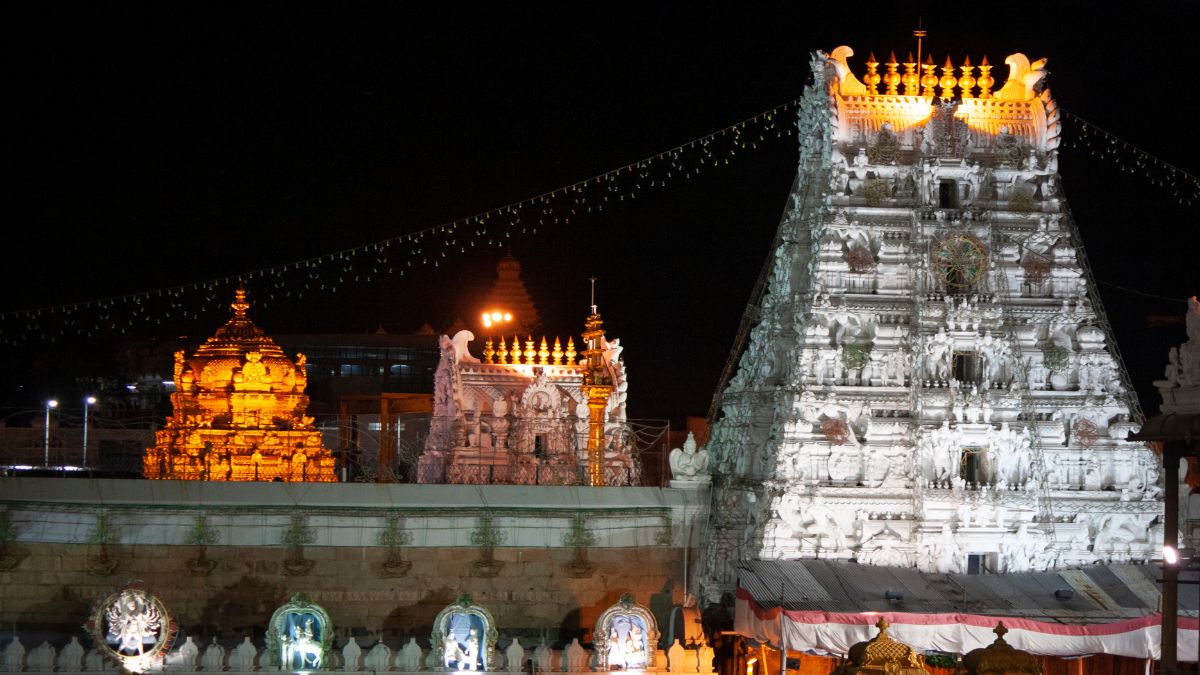
Many pilgrims are visiting the Tirumala temple today and there are two ways to do that: either visit the temple without booking tickets or book a ticket in advance. Booking Tirumala Darshan tickets online and in advance is one of the finest ways to have a perfect darshan. All that is required is a visit to the temple’s official website where visitors can make online ticket reservations. All devotees have the option of reserving seats in a variety of darshans.
As a result, special darshan dates have been set aside for July and August. The cost of a pilgrim ticket is Rs 300, and a single laddu is provided free of cost. The concept of special entry darshan, also known as seeghra darshanam, was launched on September 21, 2009 to allow travellers to enjoy a quick darshan. On their website, TTD has said bookings should be made only through their official website https://tirupatibalaji.ap.gov.in/. According to the website, devotees can book their tickets through the TTD official mobile app TT Devasthanams as well.
How to make an online reservation for special entry darshan?
- Log on to the temple’s official website.
- Enter your mobile number, then enter your OTP which you get on the mobile.
- Your calendar will now be displayed, allowing you to chose the dates you desire.
- The calendar displays colour coded availability. Green denotes availability, red denotes quota full, blue denotes quota not released, and white denotes slot not available. Yellow denotes fast filling.
- The spaces will then be chosen, and you will get to select the date.
- Select the number of individuals from the drop down menu.
- Make a list of how many laddus you need.
- You can also make hundi offerings if you want. Please keep in mind that the offerings are accepted in INR.
- After filing out all the necessary paperwork, click the continue button.
- Enter every detail such as age, name, gender, photo ID proof, and ID card.
- Pilgrims can reserve special entry darshan tickets for the next day, three hours before the darshan slot.
Things to be kept in mind during darshan
- To gain access to the terminal, you should have some sort of identity proof.
- Devotees are not allowed to enter the temple premises without tickets
- All reservations are final, with no postponement, cancellation, advancement or refund permitted.
- Children under the age of 12 must provide evidence of age to gain free admission.
Festivals
Guru Gobind Singh birth anniversary: Do you know Guru Gobind Singh Jayanti is celebrated in January, not on December 22? Know why
Even though he was born on 22nd December, Guru Gobind Singh Jayanti is observed in January by Sikhs across the world.

December 22 marks the birth anniversary of Guru Gobind Singh Ji, the tenth Sikh guru. In 1699, Guru Gobind Singh founded the Sikh warrior community called Khalsa. He is also known for introducing the Five Ks- Kesh (uncut hair), Kara (a steel bracelet), Kanga (a wooden comb), Kaccha – also spelt, Kachh, Kachera (cotton underwear), Kirpan (steel sword).
Even though he was born on 22nd December, Guru Gobind Singh Jayanti is observed in January by Sikhs across the world.
Why Guru Gobind Singh Jayanti is celebrated on January 20 and not on December 22?
The day is dedicated to the great warrior, poet, philosopher, and spiritual leader. According to the Georgian calendar, Guru Gobind Singh Ji was born on December 22, 1666, but his birth anniversary is based on the lunar calendar. That’s why Guru Gobind Singh Jayanti is celebrated in January. This year marks the 355th birth anniversary of Guru Gobind Singh Ji.
Who was Guru Gobind Singh Ji?
Guru Gobind Singh Ji was the son of Guru Tegh Bahadur Ji. When Guru Tegh Bahadur Ji was merely nine years of age, his father, Guru Tegh Bahadur Ji was killed by Aurangzeb for refusing to convert to Islam, becoming the tenth and final human Sikh Guru. Following his father’s death, Guru Gobind Ji emerged as the leader and protection of the Sikhs and continued to struggle against the Mughals’ atrocities against his community. His four sons died during his lifetime – two in battle, two executed by the Mughal army.
Notable contributions of Guru Gobind Singh Ji in Sikhism
- He is the founder of the Sikh warrior community Khalsa
- He introduced Five Ks, the five articles that Khalsa Sikhs wear at all times.
- He is credited with creating the Dasam Granth, a collection of hymns that are used in Sikh prayers and Khalsa rituals.
- He is also recognised for finalising and enshrining the Guru Granth Sahib as the primary scripture and immortal Guru of Sikhism.
Religion
Swami Dayanand Sarasvati death anniversary: Did you know? Real name of Arya Samaj founder was Mool Shankar
Born on February 12, 1824, in Tankara, a small town in Gujarat’s Morbi district, Swami Dayanand’s parents’ names were Karshanji Lalji Tiwari and Yashodabai. Brought up in a Brahmin devout family, Mool Shankar became proficient in Sanskrit and imbibed his wisdom in Hindu scriptures, especially the Vedas.

Maharishi Swami Dayanand Saraswati, who founded Arya Samaj on April 10 in 1875, dedicated his entire life to the well beings of human welfare and the prevention of religious evils. The value of Swami Dayanand’s contribution towards the salvation of the world is still remembered by his work and dedication.
Born on February 12, 1824, in Tankara, a small town in Gujarat’s Morbi district, Swami Dayanand’s parents’ names were Karshanji Lalji Tiwari and Yashodabai. After his birth, Swami Dayanand’s parents named him Mool Shankar. Swami Dayanand Saraswati’s real name was Mool Shankar. Brought up in a Brahmin devout family, Mool Shankar became proficient in Sanskrit and imbibed his wisdom in Hindu scriptures, especially the Vedas.
At the age of 21, Swami Dayanand had abandoned his home in search of spiritual and religious truth after the untimely death of his younger sister. He started questioning the larger meanings of life to his parents, by which his parents felt concerned, later Dayanand left his home to contemplate on the larger meanings of life. From 1845 to 1869, in his 25 years of journey of dispassion, he also practised yoga and other many divine activities.
Read Also: Diwali 2021: Know date, timings, and shubh muhurat for Lakshmi Puja
In April 1875, Swami Dayanand established the Arya Samaj in Bombay (now Mumbai). Dayanand’s aim was only to teach Vedas, he authored 60 books to spread the knowledge about Vedas, Satyarth Prakash (The Light of Truth) was one his most famous books. His socio-cultural movement aimed to reform society by raising awareness among the people about Vedic knowledge.
Dayanand strongly believed in equal rights for all, he led a revolutionary step to put an end to Sati Pratha – where women had to die by themselves along with their husband‘s dead body – in our society. He emphasised the need for the social upliftment of women and of the underprivileged sections of society. Later he was given the title of Maharishi and is considered as one of the prominent social reformers of our society.
-

 Cricket news20 hours ago
Cricket news20 hours agoTelugu superstar Mahesh Babu meets SRH captain Pat Cummins, says it is an absolute honour
-

 Entertainment23 hours ago
Entertainment23 hours agoAamir Khan to begin shooting in Delhi for Sitaare Zameen Par next month
-
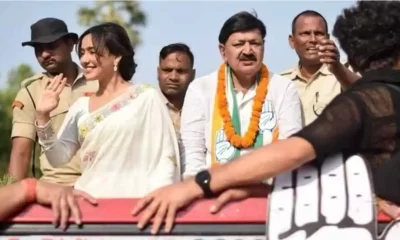
 2024 Lok Sabha Elections23 hours ago
2024 Lok Sabha Elections23 hours agoBollywood actor Neha Sharma campaigns for her father Ajit Sharma in Bhagalpur, Bihar
-

 Cricket news22 hours ago
Cricket news22 hours agoAB De Villiers criticizes RCB’s decision to let go Yuzvendra Chahal, says it was a hearbreaking moment
-
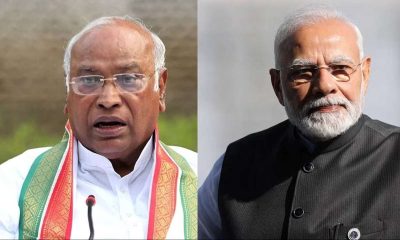
 2024 Lok Sabha Elections20 hours ago
2024 Lok Sabha Elections20 hours agoMallikarjun Kharge writes to PM Modi seeks time to explain Congress’s Nyay Patra
-

 Trending19 hours ago
Trending19 hours agoSocial media user shares video of Air India ground staff throwing expensive musical instruments, video goes viral
-
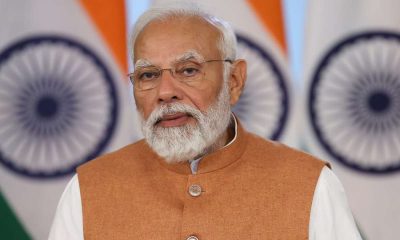
 2024 Lok Sabha Elections4 hours ago
2024 Lok Sabha Elections4 hours agoPM Modi calls for high voter turnout in second phase of Lok Sabha elections 2024, says your vote is your voice
-

 India News3 hours ago
India News3 hours agoSalman Khan house firing case: NIA interrogates arrested shooters Sagar Pal, Vicky Gupta for three hours




